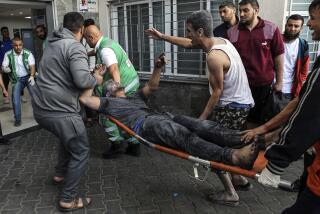Standing by the Afghans
- Share via
MORE THAN FOUR YEARS AFTER the invasion that overthrew the Taliban, Afghanistan remains a dangerous place. A suicide attack 10 days ago -- presumably targeting the U.S. ambassador, who was attending a nearby ceremony -- killed 10 people. Days earlier, there was the beheading of a high school principal by suspected Taliban militants who broke into his home and forced his wife and eight children to watch.
The violence followed a year in which nearly 1,600 people were killed in insurgent attacks and suicide bombings. The latter are an especially troubling development because such attacks were previously rare in Afghanistan. Last year’s death toll included more than 80 American soldiers, making the year the bloodiest for U.S. forces there since the invasion.
The surge in violence worries Afghans as much as the planned reduction in U.S. troops from about 19,000 to 16,000 this spring. NATO will take up the slack by expanding its force from 9,000 to 16,000, but it is uncertain if European troops will be as aggressive as Americans in searching for guerrillas, or if they will mostly provide protection for towns and cities.
Afghans see the U.S. drawing down and remember Washington’s disastrous loss of interest in the country after Soviet troops were forced out in 1989. Afghanistan descended into chaos, providing fertile ground for the Taliban to impose its extremist Islamic philosophy. Only after Al Qaeda, made welcome by the Taliban, attacked on 9/11 did most Americans remember the ruggedly beautiful land.
NATO troops are necessary to protect military and civilians on the important provincial teams that build roads, schools and government offices in a land shattered by a quarter-century of war. Dutch dithering over sending more than 1,000 troops to southern Afghanistan as part of the NATO force worries Australians, who are depending on the Dutch to protect their 200-member reconstruction team.
The Dutch government has urged parliament to approve the deployment, as has NATO’s secretary-general, Jaap de Hoop Scheffer, a former Dutch foreign minister. L. Paul Bremer III, former U.S. ambassador to the Netherlands and later Washington’s point man in Iraq, has added his support. European allies provided important support for rebuilding Afghanistan; their commitment should not waver.
Afghanistan has a centuries-old history of repelling invaders. But recent polls indicate continued strong support for U.S. and other foreign troops. Last month, an elected parliament was sworn in for the first time in more than 30 years -- an indication of the country’s progress.
But its problems are enormous: corruption, drug trafficking and the Taliban. Afghanistan deserves continued international support as the new government trains an army and police force to fight the violence on its own.
More to Read
Sign up for Essential California
The most important California stories and recommendations in your inbox every morning.
You may occasionally receive promotional content from the Los Angeles Times.













